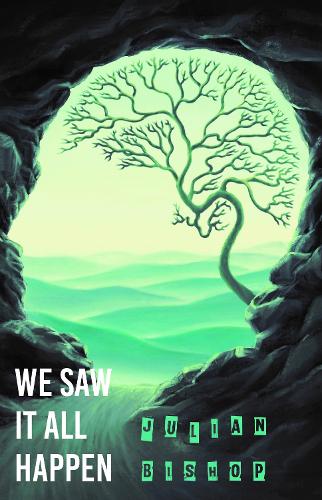
Review of We Saw It All Happen by Julian Bishop
Writing successful ecopoetry is harder than it looks. Precise definitions of ‘ecopoetry’ (as opposed to nature poetry more broadly) vary. In general this is a poetics which will propose or attempt to navigate a certain relationship between the human and nonhuman worlds, highlighting that they aren’t separated but intimately intertwined.
Julian Bishop, to judge from his collection We Saw It All Happen, is often still catching up with this concept. Some of this might be a tonal issue – certainly the old-fashioned habit of using ‘man’ or ‘mankind’ to mean ‘humankind’ was something of a throwback. More pressingly though there does seem to be, not very far under the surface of these poems, a sense of an old, Manichean divide between a pure and unsullied ‘natural’ world and an impure, corrupted ‘human’ one.
In many ways, this is to be expected: humans have done, and continue to do, a great deal of damage to our planet, and there are times when Bishop’s evocation of it is urgent and energising. A surprise favourite of mine from later in the collection, ‘Plastic Rain’, is a masterclass in embedding images of horror in the language of warped fantasy: ‘In summer, drifts of single use snow / refused to melt. And a child could touch a rainbow.’
Bishop’s earnest paeans to the various threatened species do not always land effectively. The conceit of packaging the collection as a ‘menu’, offering up animals and plants as sacrifices to our relentless consumption, can veer between nauseatingly effective (as in ‘Poached Salmon’ with the stricken fish struggling in ‘parboiled water’) and bathetic (as in ‘Remember When Hippos Used to Swim?’, where they ‘sizzle like / sausages in a huge / African frying pan’).
In the worst cases, as in ‘Highlights of Mining for Gold in Indonesia’, when you read that an orangutan is ‘conscious her infrequent offspring / are popular as pets in Taiwan’, the attempts at a creaturely perspective strike the ear so unusually that the spell is broken completely.
At times the dichotomy between ‘human’ and ‘natural’ can tip into the troublingly anti-human. ‘Divorce Hearing’, for example, takes an admittedly witty dramatic device and runs with it to an end where, effectively, the world is a ‘vacated property’ claimed back by the nonhuman world, ‘sea lapping against the sills, / bare boards riddled with worm, / rafters exposed to baking sun’. This nihilism is gleefully presented, but it’s also profoundly dangerous both as an idea in its own right and to the wider project of rallying humans to defend a world of which, after all, they remain a part.
I think Bishop knows this, and he is certainly intelligent enough to avoid the worst of the softly ecofascist, ‘humans are the virus’ utterances that attended the early stages of COVID-19. Bishop’s own ‘Lockdown Sonnets’ seem to be edging towards that territory, rhapsodising the clean air and blue skies and clear water, before ending with ‘my God, it came at a price’. Feelings of despair and anger at our collective situation are a reality which all ecologically minded people, artists and activists alike, must navigate, but a ‘divorce’ would be no way forward, even if it were possible.
Still, the beauty of the world that Bishop wants to save also produces poetry of unambiguous, sensual brilliance. There are moments when this collection achieves an exquisite tension: awe at the beauty of the nonhuman world, menaced by the spectre of extinction and collapse. In ‘I’m Hooked on the Jellyfish Live Cam’ the reader is hypnotised by the wildlife’s weightless majesty: ‘Who wouldn’t envy those who glissade / through life like this, oblivious to the tide, unburdened / by flesh’. The spectacle stays with the poet even ‘away from the screen’, where we know that danger lurks and action must be taken.
This is an uneven, overgrown garden of a collection, and I rolled my eyes as frequently as I nodded in admiration and delight while reading it. Ultimately though, Bishop is surely right to say that ‘no caveats, we need to see change’, and every effort to move us towards it should be applauded, for all our sakes.
Tim Kiely is a criminal barrister and poet based in East London. He is the author of ‘Hymn to the Smoke’, ‘Plaque for the Unknown Socialist’ and ‘No Other Life’. Buy his work at timkielybooks.bigcartel.com. Visit his WordPress at timkielypoetry.wordpress.com.’
